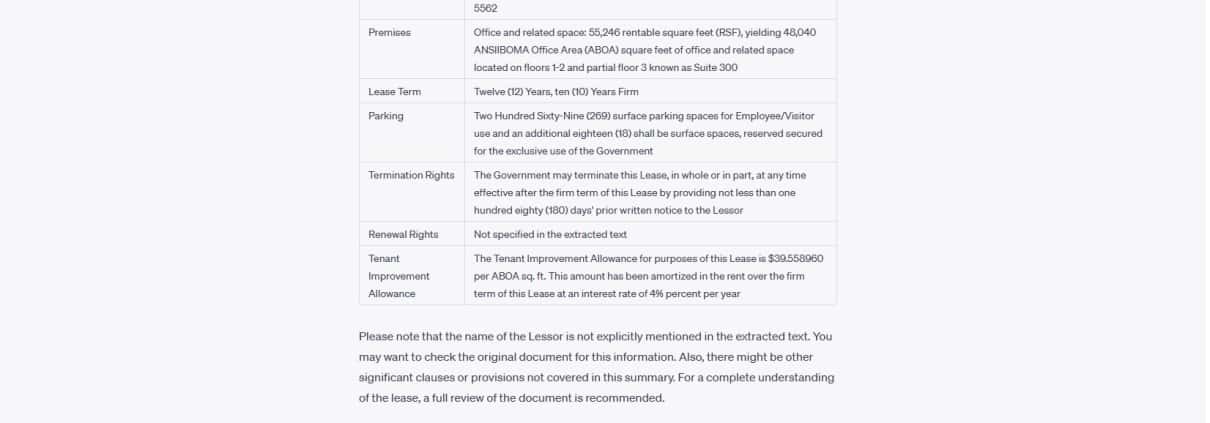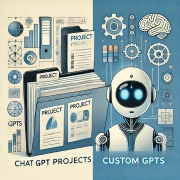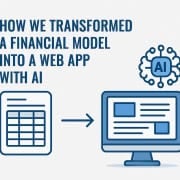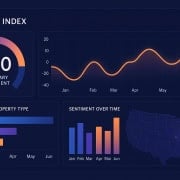Using ChatGPT as a Real Estate Analyst to Create a Lease Abstract
As you may know, we here at A.CRE have been exploring various use cases for AI in commercial real estate. When ChatGPT plugins were released in May 2023, the tool gained an ability to act like a young real estate analyst; namely to source and organize information. The first such use case showed how connecting the AI to a database of properties allowed ChatGPT to find rent comps and organize them into a table for a property tax appeal. In today’s video, I’ll show you how ChatGPT acts like an analyst to read a commercial real estate lease and then create a lease abstract of that lease.
As with the property tax appeal example, I think this is a glimpse into the future of real estate analysis. While human intuition isn’t going away anytime soon, the real estate analyst role is going to change dramatically as the speed to gather and assess information is improved by AI tools like this.

Partial output after ChatGPT was fed a commercial lease in pdf format.
What is GPT, ChatGPT, OpenAI, ChatGPT Plugins, Google Bard, etc?
Given that we’ve now shared numerous posts in this series, I assume you’re well aware of what ChatGPT and natural language models are. I also assume you’re familiar with its creator, OpenAI and the significant advances in artificial intelligence (including advances in artificial intelligence in real estate) that are currently underway.
I also assume you’re aware of comparable tools that have been developed (e.g. Google Bard, ChatSonic, Perplexity AI, etc) and the way teams are integrating those natural language models with other tools to expand their functionality (e.g. ChatGPT plugins).
Therefore, I won’t rehash those concepts here. However, if any of this is new (or you’re looking to learn more) you might check out our Using ChatGPT in Real Estate guide or our list of AI resources for real estate professionals.
Using ChatGPT as a Real Estate Analyst to Create a Basic Lease Abstract
So, how might natural language models such as ChatGPT (or Google Bard) be used as a real estate analyst? In the following video, I use a ChatGPT plugin called AskYourPDF to give ChatGPT access to a commercial real estate lease. I then prompt the AI to read the lease and extract the key points from the lease (i.e. create a basic lease abstract).
As I’ve mentioned in previous posts, the traditional role of a real estate analyst is to source information (e.g. find and read commercial leases), organize that information per the instructions of their superior, and then assist the firm in making some real estate decision. I would estimate that at least 75% of an analyst’s time is spent sourcing information, and entering/organizing that information into some format and medium (e.g. an Excel file or Word Doc) so that a more seasoned professional can digest it.
In the following video, you’ll see ChatGPT perform that exact role: read a commercial real estate lease, find the points that are most important, and then organize those points in a way for others to review.
A few points of caution however before you continue: 1) uploading confidential information to a third party may break confidentiality agreements you may have signed. Proceed with caution before uploading confidential information to OpenAI or AskYourPDF and 2) the tool is very much in its infancy. It occasionally hallucinates (i.e. creates fake information), so don’t rely 100% on ChatGPT for your lease abstracts!
Enjoy the video and I hope you too feel like this is a glimpse into the future of real estate analysis.
- Click here to read the entire ChatGPT conversation from the video.
Frequently Asked Questions about Using ChatGPT as a Real Estate Analyst to Create a Lease Abstract
What role does ChatGPT play in creating a lease abstract?
ChatGPT functions like a junior real estate analyst. Using a plugin like AskYourPDF, it can read a commercial lease document and extract key information—such as lease terms, rent details, and tenant obligations—then organize that data into a basic lease abstract.
How does this process compare to the traditional analyst’s workflow?
Traditionally, a real estate analyst spends up to 75% of their time sourcing and organizing information for senior professionals to review. ChatGPT automates this step by quickly processing documents and producing structured summaries, saving substantial time and effort.
What tools or plugins are used to enable ChatGPT to read leases?
The AskYourPDF plugin is used in this example to give ChatGPT access to the content of a commercial lease PDF. This allows the AI to analyze and extract key lease details in response to user prompts.
What are the risks or limitations of using ChatGPT for lease abstraction?
Key risks include the potential breach of confidentiality agreements if sensitive data is uploaded, and the fact that ChatGPT may “hallucinate” or fabricate information. Users should always double-check results for accuracy and compliance.
Can ChatGPT fully replace a human analyst for lease abstraction?
Not entirely. While ChatGPT can rapidly process and summarize lease information, human intuition and judgment are still needed to verify results, catch nuances, and ensure legal compliance. The tool enhances efficiency but does not eliminate the need for human oversight.
What types of lease information can ChatGPT extract?
ChatGPT can extract terms such as lease start/end dates, base rent, escalation clauses, tenant responsibilities, renewal options, and termination conditions—depending on the clarity and structure of the lease document.
Why is this considered a glimpse into the future of real estate analysis?
This process demonstrates how AI can automate repetitive, data-intensive tasks traditionally handled by analysts. It suggests a future where analysts spend more time on high-value, strategic work and less on manual information gathering.
Where can I see the full demonstration of this process?
The full video showing how ChatGPT reads and abstracts a lease using the AskYourPDF plugin is available in the linked blog post, along with a full transcript of the conversation between the user and ChatGPT.









